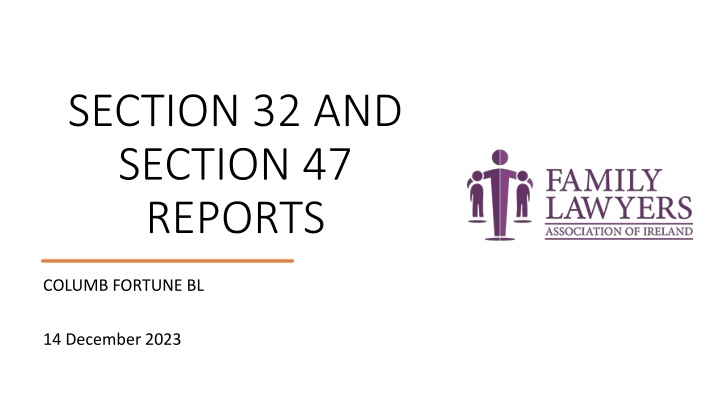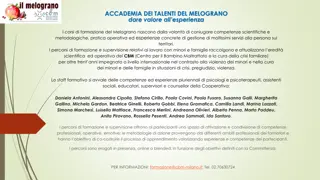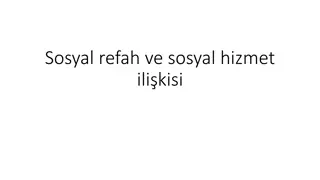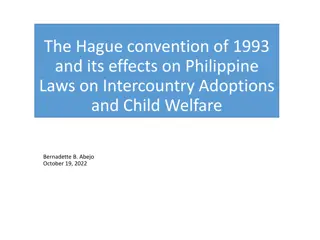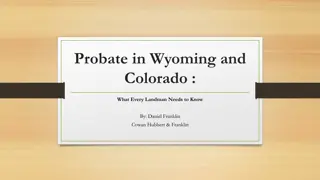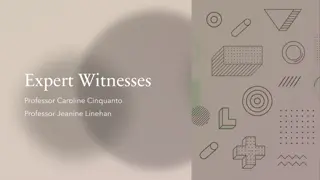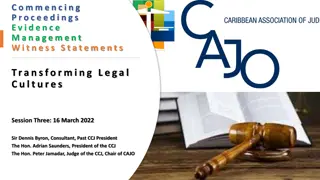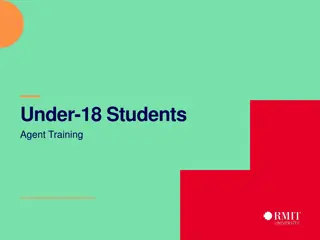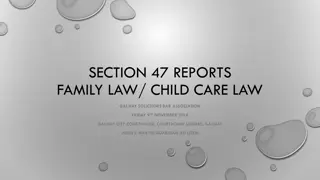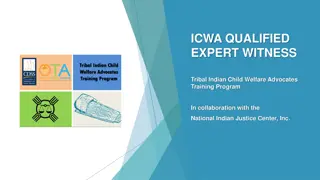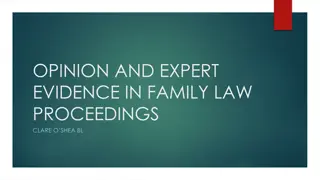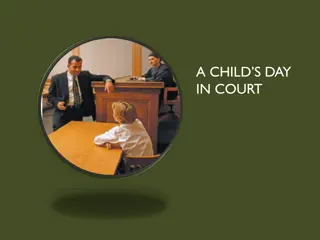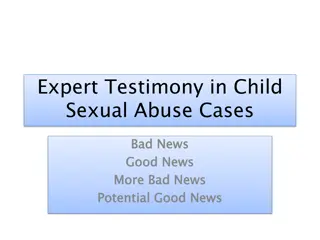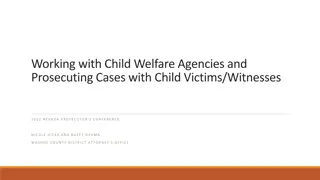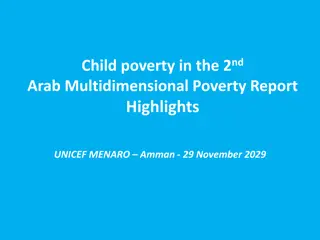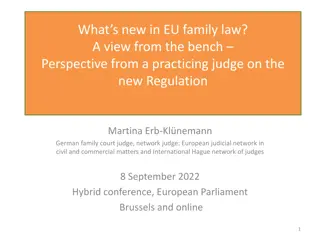Expert Reports and Child Welfare in Legal Proceedings
In legal proceedings concerning children, Section 32 allows for expert reports to be obtained to address questions affecting the child's welfare. The court may appoint experts to convey the child's views or give directions for obtaining reports. Reports can be provided as evidence and must consider the child's age, maturity, and best interests. Regulations specify qualifications for preparing reports, including the need for specific professionals and adherence to standards.
Uploaded on Apr 19, 2024 | 3 Views
Download Presentation

Please find below an Image/Link to download the presentation.
The content on the website is provided AS IS for your information and personal use only. It may not be sold, licensed, or shared on other websites without obtaining consent from the author.If you encounter any issues during the download, it is possible that the publisher has removed the file from their server.
You are allowed to download the files provided on this website for personal or commercial use, subject to the condition that they are used lawfully. All files are the property of their respective owners.
The content on the website is provided AS IS for your information and personal use only. It may not be sold, licensed, or shared on other websites without obtaining consent from the author.
E N D
Presentation Transcript
SECTION 32 AND SECTION 47 REPORTS COLUMB FORTUNE BL 14 December 2023
SECTION 32 REPORTS SECTION 32 REPORTS Section 32(1): [i]n proceedings to which section 3(1)(a) applies, the court may, by order, do either or both of the following: (a) give such directions as it thinks proper for the purpose of procuring from an expert a report in writing on any question affecting the welfare of the child; or (b) appoint an expert to determine and convey the child s views. May be made on court s own motion or on behalf of parties Court shall have regard to any views expressed to it in relation to the matter by or on behalf of a party to the proceedings concerned or any other person to whom they relate.
Section 32(4) A copy of a report under subsection (1)(a) may be provided in evidence in the proceedings and shall be given to (a) the parties to the proceedings concerned, and (b) subject to subsection (5), if he or she is not a party to the proceedings, to the child concerned. Section 32(6) provides for the duties of the expert which include furnishing to the court a report which shall put before the court any views expressed by the child in relation to the matters to which the proceedings relate.
Section 32(5); In determining whether a report obtained under subsection (1)(a) should be furnished to the child to whom it relates, the court shall have regard to the following: (a) the age and maturity of the child and the capacity of the child to understand the report; (b) the impact on the child of reading the report and the effect it may have on his or her relationship with his or her parents or guardians; (c) the best interests of the child; (d) whether the best interests of the child would be better served by the furnishing of the report to the parent, guardian, next friend of the child or an expert appointed under subsection (1)(b), rather than to the child himself or herself
SI SI 587 587/ /2018 (Child s (Child s Views 2018 Guardianship Guardianship of of Infants Views Expert) Expert) Regulations Regulations 2018 Infants Act 2018 Act 1964 1964 Qualifications to prepare Section 32(1)(b) Voice of the Child reports not welfare reports Psychiatrists, Psychologists, Social care worker, Social worker, Registered teacher Must have PII List of minimum standards that apply to performance of functions
SECTION 47 REPORTS SECTION 47 REPORTS Section 47(1) of the Family Law Act 1995 provides the court may, of its own motion or on application to it in that behalf by a party to the proceedings, by order give such directions as it thinks proper for the purpose of procuring a report in writing on any question affecting the welfare of a party to the proceedings or any other person to whom they relate from (a)such probation and welfare officer as the Minister for Justice may nominate; (b)such person nominated by Child and Family Agency being a person who, in it s opinion is suitably qualified for the purpose, or (c)any other person specified in the order.
SECTION 47 CONTD Section 47(3): A copy of a report shall be given to the parties to the proceedings concerned and (if he or she is not a party to the proceedings) to the person to whom it relates and may be received in evidence in the proceedings. Section 47(5): The court or a party to proceedings to which this section applies may call as a witness in the proceedings a person who prepared a report...
WEIGHT TO BE GIVEN IN FAMILY LAW PROCEEDINGS LB v TMacC [2004] IEHC 409, O'Higgins J: it would be wrong of the Court to accept unquestioningly the evidence of an expert and to substitute expert opinion for the independent judgment of the court This approach was endorsed by the Supreme Court on appeal.
JMcD v PL and BM - HIGH COURT JMcD v PL and BM [2009] IESC 81 In the High Court, Hedigan J. considerable weight The Court should depart from the recommendations contained in the report only for grave reasons which should be clearly set out Thus set a high bar for deviating from the terms of a Section 47 report.
JMcD v PL and BM SUPREME COURT Murray CJ: I agree that the ordinary rules of evidence concerning such a report should apply. A trial judge must be free, for stated reasons, to depart in his or her findings from evidence contained in such a report either because there is other more persuasive evidence or because he or she is not sufficiently persuaded by the report as to the correctness of a particular fact or conclusion in it.
Denham J.: The person writing the report remains an expert giving his or her opinion to the court. The report is produced to assist the court. While it is a matter to be weighed in all the circumstances of the case, it should not, as a mandatory matter, be accorded great weight. A court is neither obliged to accept the report, nor is it required to expressly specify its reasons for non-acceptance of the report. The report should be considered carefully, by the trial judge, together with all the factors and circumstances of the case, and it may assist the trial judge in determining what is in the best interests of the child, whose welfare is the paramount consideration.
DK v PIK HIGH COURT - DK v PIK [2021] IEHC 516 Relocation case three children aged 14, 12 and 10 Mother wished to relocate to Denmark, father to remain in Italy Section 47 Report by clinical psychologist recommended relocation to Denmark if parties could not agree to reside in the same country Assessor had assessed father as having difficulties in expressing emotions O Hanlon J.: Opinion evidence only Unnecessarily negative about the father. lack of balance Did not accept the recommendations of the assessor
DK v. PIK COURT OF APPEAL - CHILDRENS VIEWS OR EVIDENCE? DK v. PIK [2022] IECA 54, Collins J.: Judge O Hanlon had spoken to all three children Placed reliance on the children s views and wishes DAR of those discussions sought by PIK the last piece of evidence
Fair procedures require all evidence (State (D and D) v Groarke [1990] 1 IR 305) Judge may have been entitled to reject the evidence of assessor, but her decision was influenced greatly by her meetings with the children It was necessary that the basic evidence on which that decision was based would be available to the parties for the purposes of the appeal.
Meeting should not be an evidencegathering exercise DK opposed the application as wholly inappropriate for the children to be cross-examined Children s discussion with the Judge was not evidence
OD v OD GUIDELINES O D v. O D [2013] 3 IR 189 Mr Justice Abbott 1. Clarity as to the legislative framework 2. Judge should not act as an expert 3. Terms of reference before meeting should be agreed 4. Explain to children that their wishes will be taken into consideration but may not determine it 5. Court should explain the law and reason to hear the voice of the child to the child in simple terms 6. As soon as possible Court should establish if voice of child is necessary 7. Court should avoid speaking to the children in confidence unless parents agree
YB v. ZB [2023] IECA 154 Judicial Separation proceedings in October 2021 Parental Alienation child was 17 Suggestion for Section 47 for reconciliation Summer 2022 a relocation October 2022 motion for S47 Husband wanted a report, wife said 17 year old should not be required to engage
High Court: Very strong grounds required disrespect X s rights and autonomy Held: that part of the intention behind the request for the report would be to compel X to divulge the reasons for the estrangement which is effectively a fact finding mission rather than a process primarily directed to her welfare
Grounds of Appeal 1. Application pertained to welfare so should have been taken at height 2. HCt drew inferences where conflicting affidavit evidence 3. HCt relied on averments that child did not want to participate (4. Legal grounds: S47 has broad potential)
Grounds of Opposition 1. Section 47 can only be made in respect of any question of welfare and that was being sought 2. Age of the child 3. Evidential grounds
Ms Justice Butler What is the Court s jurisdiction to direct an assessment under S47 in the absence of any relief being sought in respect of the welfare of the person concerned? Judicial Separation and Family Law Reform Act 1989 section 3(3) Family Law Act 1995 section 10(1)(f) Welfare goes far beyond custody and access
Section 47(3) To a certain extent the understanding of the lawyers acting on behalf of the parties in this case does not coincide with the contents of this sub-section. The procedure as described by the lawyers (who undoubtedly have significant experience in these matters) is that the report is prepared for and presented to the court; the parties can have access to it through their solicitors and, if a report were to be prepared on X, it would only be provided to X on the direction of the court. It is certainly possible to envisage circumstances in which it would not be in a child s best interests to be given access to a report prepared in the context of the breakdown of their parents relationship but, as the section envisages that the report will automatically be provided to the person to whom it relates, it would seem that technically in such cases an application should be made to court for a direction that the report is not to be provided to the child rather than requiring the converse application.
Date of appeal, child was almost 18 Is Section 47 free-standing ? Claim of PA No specific relief sought Conduct under Section 16 impacting proper provision? No case on point Butler J: [section 47] is not a free-standing relief, but rather a procedure which may be called in aid to assist a court in reaching a conclusion as to the grant or refusal of other relief which has been sought by the parties to the proceedings
The usual terms The usual terms MS v. Gibbons & HSE [2007] IEHC 218 JR relating to private family law Direction for S20 report (Childcare Act 1991) Reasonable access to the report In camera to protect children and family affairs No repercussions for breaches of in camera rule Reasonable access?
A recent case S47 report lodged CCt directed release on strict terms (only rec s could be discussed) Not to divulge contents of report Audi Alteram Phelan J (ex tempore) release full report (consent) Section 47(3) is clear; a copy of the report shall be given to the parties
Conclusion Conclusion Expert s ultimate duty is to assist the court, confine evidence to what is within his scope of expertise; Matter for the Court what weight to be given to an expert s opinion Court must considercarefully what is contained in report but neither obliged to accept the report nor is it required to expressly specify the reasons for non-acceptance . [JMcD v. PL and BM] Releasing reports - why? Practicalities of providing reports
Thank you for your attention
